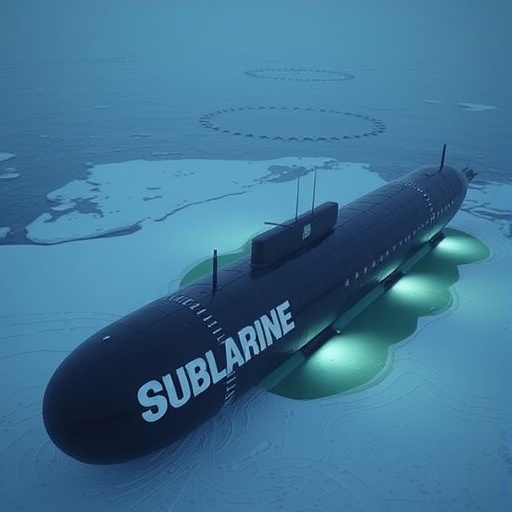The University of Gothenburg has secured a significant advancement in polar marine research with the acquisition of a new autonomous underwater vehicle (AUV), Ran II, to succeed its predecessor, Ran, which was tragically lost beneath the icy depths of an Antarctic glacier in early 2024. This acquisition, enabled by generous contributions from the Voice of the Ocean Foundation and insurance funds, will ensure that groundbreaking oceanographic expeditions can continue, fostering a deeper understanding of some of the most inaccessible and dynamic marine environments on our planet.
Ran, the original AUV commissioned in 2018, quickly distinguished itself as a vital tool for submarine explorations in extreme and precarious conditions. Her missions ventured under floating glaciers and thick sea ice in both Swedish and international waters, pushing the boundaries of where manned vessels could safely reach. Over six years, Ran amassed an unparalleled collection of high-resolution data, revolutionizing our comprehension of the interactions between ocean currents, ice masses, and climate change, particularly in the context of the Antarctic’s Thwaites Glacier.
In a landmark moment for ocean science, Ran was the first research AUV globally to penetrate beneath the Thwaites Glacier, often dubbed the “Doomsday Glacier” due to its alarming rates of melting and potential contributions to sea-level rise. While satellite imaging had previously highlighted melting activity, Ran’s close-up imaging and sensor data illuminated the precise physical mechanisms driving this sub-ice melting. This insight is proving invaluable in modeling future glacier dynamics and global climate scenarios.
The loss of Ran during a perilous mission in January 2024 was a profound setback but also underscored the inherent risks of cutting-edge polar research. Rather than marking an end, however, this event paved the way for innovation. The forthcoming Ran II will incorporate significant improvements over its predecessor, including enhanced decision-making algorithms powered by advanced artificial intelligence and more robust emergency protocols. Improved navigational systems will grant Ran II greater precision in maneuvering through labyrinthine under-ice environments, reducing the risk of mission failure and vehicle loss.
Constructed by Kongsberg AS, a leader in marine technology, Ran II’s design prioritizes adaptability to diverse and extreme environments such as subglacial cavities, thick winter sea ice zones, and the deep seabed. This next-generation AUV will carry an array of sophisticated sensors capable of simultaneous high-resolution measurements of underwater topography, current dynamics, and water chemistry. These capabilities are critical for unraveling the complex feedback loops between oceanographic conditions and cryosphere stability.
The strengthening partnership between the University of Gothenburg and the Voice of the Ocean Foundation represents a strategic fusion of scientific ambition and environmental advocacy. Through VOTO’s Ocean Support initiative, researchers will gain unprecedented access to state-of-the-art autonomous platforms and data infrastructures not only in polar regions but also in more accessible waters like the Baltic Sea. This collaboration is poised to accelerate marine research, amplify scientific literacy, and foster a global community invested in ocean stewardship.
Voice of the Ocean’s CEO, Sanna Thimmig Johansen, emphasized the mission’s urgency: “The ocean needs our attention more than ever.” The investment in Ran II and the alliance with leading scientific institutions signify a commitment to pushing the frontier of polar science. Ran II will be a linchpin for Swedish marine research, extending the country’s leadership in autonomous underwater technology and polar oceanography.
The technological evolution of AUVs has surged alongside advancements in artificial intelligence, enabling vehicles like Ran II to autonomously analyze vast datasets, optimize mission routes in real time, and respond adaptively to unforeseen challenges. This autonomy is crucial for exploring remote and fragile ecosystems where human intervention is limited or impossible. The synergy between cutting-edge robotics and ocean science marks a transformative era in environmental monitoring.
Ran’s pioneering expeditions yielded some of the most detailed sub-ice bathymetric maps and water property profiles ever recorded. For instance, her 2019 data unveiled the intrusion of warmer, saline waters beneath Thwaites Glacier, a phenomenon accelerating melting and ice retreat. Subsequent surveys identified previously unknown structural features beneath the glacier, indicating episodic melting processes deep under the ice sheet. These discoveries are opening new interdisciplinary research avenues, combining oceanography, glaciology, and climate science.
The data richness provided by Ran’s missions equips researchers to construct more accurate climate models and validate satellite observations with in situ measurements. The ability to observe conditions beneath ice shelves with fine spatial and temporal resolution is crucial for understanding how oceanic heat fluxes influence glacier stability. These insights have implications not only for Antarctica but for global sea-level rise projections and climate impact assessments.
Looking forward, Ran II is expected to extend these capabilities, integrating next-generation sensor suites and AI-driven decision support systems that will enhance both safety and scientific productivity. With scheduled delivery in the Antarctic winter of 2026/2027, this new vehicle will play a pivotal role in ongoing efforts to monitor polar environments undergoing rapid transformation due to climate change.
The University of Gothenburg’s sustained commitment to AUV-based research cements its position at the forefront of this rapidly evolving field. By harnessing autonomous technologies capable of probing beneath the ocean’s surface, scientists are unlocking secrets that could help humanity mitigate and adapt to environmental changes on a planetary scale. Ran II symbolizes not only technological prowess but also the spirit of exploration and resilience in the face of nature’s challenges.
Subject of Research: Autonomous Underwater Vehicles (AUVs) and polar oceanographic research focused on understanding ice-ocean interactions under Antarctic glaciers.
Article Title: University of Gothenburg Secures Next-Generation AUV for Advancing Antarctic Subglacial Exploration
News Publication Date: 2024
Web References:
- Voice of the Ocean: www.voiceoftheocean.org
Image Credits: Filip Stedt
Keywords: Autonomous Underwater Vehicle, AUV, Ran II, Thwaites Glacier, Antarctic research, subglacial exploration, oceanography, climate change, polar science, marine technology, artificial intelligence, University of Gothenburg




